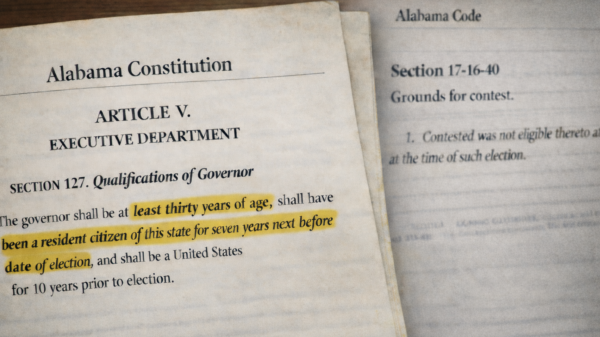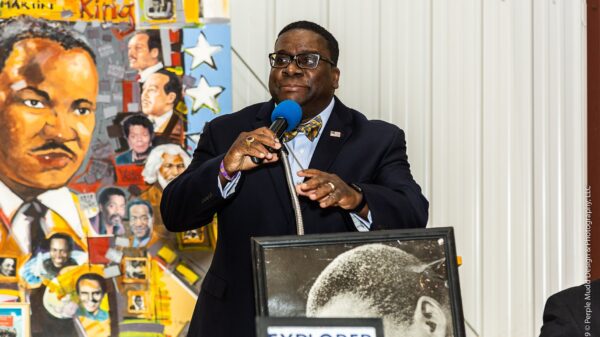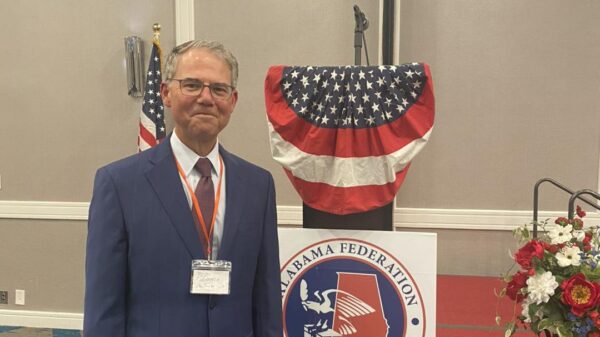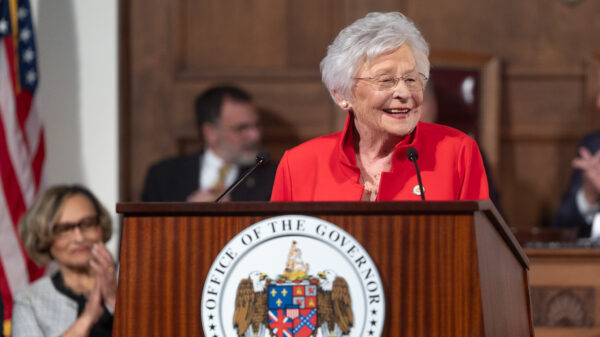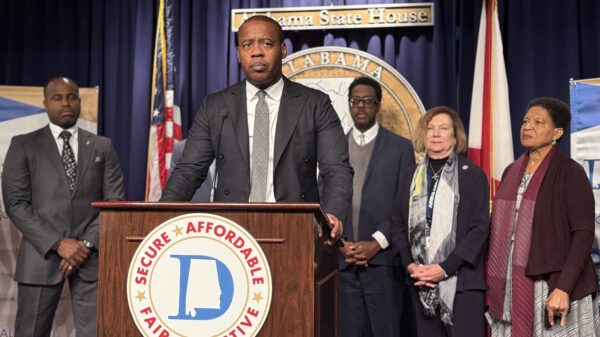State Rep. Ben Robbins is a political opportunist who seized on an artificial panic he has contributed to. He appeared on far-right talk radio last week touting his victory over the supposed evil pornography empire that is Pornhub. Aylo, the Canadian-based parent company of the popular adult tube site, geo-blocked Alabama users who can now only access the platform by a VPN. This is because last legislative session he managed to whip the Republican-led majority to pass his “porn ID” legislation – House Bill (HB) 164.
Excluding a tax levy provision, HB 164 entered force on Oct. 1, making it a requirement for online adult entertainment platforms operating in Alabama’s digital space to check the ages of their users through government-issued ID cards or other means. While the bill is presented as a response to a public health crisis, Robbins and his allies have lied.
This law gives Alabama’s far-right leadership the ability to restrict and censor forms of speech they don’t agree with but are otherwise protected by the First Amendment.
Even if you don’t like porn, this should anger you. Dozens of civil liberties organizations have campaigned against age verification laws for many reasons. And, it isn’t because organizations like the American Civil Liberties Union (ACLU) or the International Centre for Missing and Exploited Children have been bought off by large technology companies or porn website operators. Nor do these civil society organizations believe that minors should be exposed to age-inappropriate materials. The efforts to fight age verification laws actually deal with the need to counter a growing trend in censorship instigated by predominantly GOP-backed pressure organizations and pro-MAGA populist politicians.
Concern for these issues goes well beyond the state of Alabama and Rep. Robbins. It’s a consistent fear for the survival of civil liberties in the U.S., threatened by an organized and well-funded effort to hijack representative democracy through iron-fisted politicking.
The Alabama Political Reporter published a previous column I wrote discussing HB 164 and proposals stemming from Project 2025 and the conservative Heritage Foundation.
Much has been written about the project and the proposals it touts. Kevin Roberts, the president of the Heritage Foundation, told The New York Times Magazine earlier in the year that Project 2025 is an effort for “institutionalizing Trumpism.” But only if Donald Trump and his running mate, Sen. J.D. Vance of Ohio, are successful in the 2024 race.
What a striking admission, considering what the project outwardly supports. All of what I am about to discuss here can be found in Mandate for Leadership: The Conservative Promise, a 922-page long book touting the agenda of the Project 2025 political vision.
Multiple authors from various groups looking to capitalize on a conservative presidency propose outlandish reforms and policy concepts to reshape the government completely.
Many of the contributors to the proposals are a who’s-who of the right-wing think tank ivory tower. Folks like former Trump administration officials, climate deniers, Christian conservatives, far-right attorneys, and many others comprise the Project 2025 makeup.
Assembled as a so-called “plug-in-and-play” presidential administration for Trump, the project is a forum for hard-right Christian nationalism built on hysterical economic and cultural doomerism. Drawing back safety net programs, shrinking whole portions of the administrative state, overturning environmental protection measures, restricting bodily autonomy for women, and gutting LGBTQ+ protections are all proposals on the table. Part of the focus is to also censor what Project 2025 considers to be material identified as “pornography.” And, the term “pornography” in the case of this movement is broad.
Roberts, writing in the foreword of Mandate for Leadership, falsely conflates LGBTQ+ subject matter deemed appropriate for minors with adult content that is, well, deemed only appropriate for adults. He also makes calls to imprison “pornographers” and that he feels porn should be stripped of the protections of the First Amendment.
Journalists like myself, commentators, academics, and activists view Roberts’ words as a threat to secular society. On top of that, the mere fact that someone as influential to the Trump movement as Roberts is preaching this sort of vision is telling. While it may be a far-fetched concept to some, two key events suggest the far-right is not going to falter in attempting to ban material they don’t like, like material dealing with sexuality, from the national popular culture. The first event features Christian nationalist Russell Vought being caught on camera by undercover journalists posing as potential donors.
The Centre for Climate Reporting, a non-profit journalism outfit, sent in reporters posing as folks interested in donating to Project 2025 and its efforts during the 2024 election.
While focused on holding large oil and gas companies accountable, these journalists captured Vought discussing how he and Project 2025 intend to ban porn using the “back door” of age verification laws. Vought is a co-author of Project 2025 and currently leads a Christian nationalist think tank called the Center for Renewing America (CRA). CRA has drafted model legislation alongside other groups, like the Ethics and Public Policy Center or American Principles Project, for MAGA conservatives and far-right lawmakers. Key portions of the model legislation from these Project 2025 member organizations directly deal with age-gating websites they view as obscene, regardless of the legality.
Secondly, there is a case before the U.S. Supreme Court involving adult entertainment industry companies and the state of Texas. The ACLU represents the Free Speech Coalition and the parent companies of the world’s largest adult platforms in a case brought against Texas Attorney General Ken Paxton, a strong anti-porn advocate. Paxton is defending House Bill (HB) 1181, which was adopted by the Texas state legislature to severely restrict adult users’ access to legal adult content online.
HB 1181 was initially deemed unconstitutional but a federal appeals court found it to be constitutional. However, the immediate issue before the Supreme Court is that the appeals court applied a much lower burden of proof to determine constitutionality. It is standard procedure for federal courts to apply strict scrutiny when determining the constitutionality of a law dealing with the First Amendment, but, the U.S. Fifth Circuit Court of Appeals only applied the standard of rational review, a much lower standard. It is the hope of the civil society organizations that filed amicus briefs in support of the adult stakeholders (e.g., Foundation for Individual Rights and Expression, Cato Institute, Woodhull Freedom Foundation, Institute for Justice, Electronic Frontier Foundation, etc.) that the conservative-leaning high court rules in favor of protecting basic civil liberties.
Considering both of these events, the backdrop where Robbins’ HB 164 enters force is stuck emphasizing a literal fight for survival – the survival of a legal, regulated industry, the survival of First Amendment rights for all people, and the survival of a free society.
Alabama became a much more restrictive place thanks to Rep. Robbins and his ilk. But it doesn’t have to be that way, so long voters in Alabama realize that laws requiring age verification requirements to access anything on the internet, not just adult content, are tantamount to book bans, prohibitions on controversial speech, and content restrictions.
Michael McGrady Jr is a journalist and commentator covering the adult entertainment industry.

